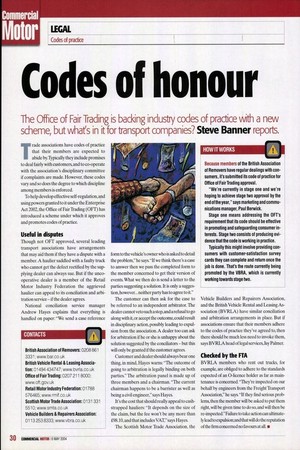Codes of honour
Page 30

If you've noticed an error in this article please click here to report it so we can fix it.
The Office of Fair Trading is backing industry codes of practice with a new
scheme, but what's in it for transport companies? Steve Banner reports.
Trade associations have codes of practice that their members are expected to abide by. Typically they include promises to deal fairly with customers, and to co-operate with the association's disciplinary committee if complaints are made. However, these codes vary and so does the degree to which discipline among members is enforced.
To help develop effective self-regulation, and using powers granted to it under the Enterprise Act 2002, the Office of Fair Trading (OFT) has introduced a scheme under which it approves and promotes codes of practice. Useful in disputes
Though not OFT approved, several leading transport associations have arrangements that may aid them if they have a dispute with a member. A haulier saddled with a faulty truck who cannot get the defect rectified by the supplying dealer can always sue. But if the uncooperative dealer is a member of the Retail Motor Industry Federation the aggrieved haulier can appeal to its conciliation and arbitration service — if the dealer agrees. National conciliation service manager Andrew Hayes explains that everything is handled on paper: "We send a case reference
form to the vehicle's owner who is asked to detail the problem," he says. "If we think there's a case to answer then we pass the completed form to the member concerned to get their version of events. What we then do is send a letter to the parties suggesting a solution. It is only a suggestion, however.., neither party has to agree to it."
The customer can then ask for the case to be referred to an independent arbitrator. The dealer cannot veto such a step, and a refusal to go along with it, or accept the outcome, could result in disciplinary action, possibly leading to expulsion from the association. A dealer too can ask for arbitration if he or she is unhappy about the solution suggested by the conciliators — but this will only be granted if the customer agrees.
Customer and dealer should always bear one thing, in mind, Hayes warns: "The outcome of going to arbitration is legally binding on both parties." The arbitration panel is made up of three members and a chairman. "The current chairman happens to be a barrister as well as being a civil engineer," says Hayes.
It's the cost that should really appeal to cashstrapped hauliers: "It depends on the size of the claim, but the fee won't be any more than £98.10, and that includes VAT," says Hayes. The Scottish Motor Trade Association, the
Vehicle Builders and Repairers Association, and the British Vehicle Rental and Leasing Association (BVRLA) have similar conciliation and arbitration arrangements in place. But if associations ensure that their members adhere to the codes of practice they've agreed to, then there should be much less need to invoke them, says BVRLA head of legal services, Jay Palmer. Checked by the FTA BVRLA members who rent out trucks, for example, are obliged to adhere to the standards expected of an 0-licence holder as far as maintenance is concerned. "They're inspected on our behalf by engineers from the Freight Transport Association," he says. "If they find serious problems, then the member will be asked to put them right, will be given time to do so, and will then be re-inspected." Failure to take action can ultimately lead to expulsion; and that will do the reputation of the firm concerned no favours at all. •
Because members of the British Association of Removers have regular dealings with consumers, it's submitted its code of practice for Office of Fair Trading approval.
"We're currently in stage one and we're hoping to achieve stage two approval by the end of the year," says marketing and communications manager, Paul Berwick.
Stage one means addressing the OFT's requirement that its code should be effective in promoting and safeguarding consumer interests. Stage two consists of producing evidence that the code is working in practice.
Typically this might involve providing consumers with customer-satisfaction survey cards they can complete and return once the job is done. That's the route currently being promoted by the VBRA, which is currently working towards stage two.
British Association of Removers: 0208 861 3331: www.barco.uk British Vehicle Rental & Leasing Association: 01494434747; www.bvria.co.uk Office of Fair Trading: 0207 211 8000; www.oft.gov.uk Retail Motor Industry Federation: 01788 576465; www.rmif.co.uk Scottish Motor Trade Association: 0131 331 5510; www.smta.co.uk Vehicle Builders & Repairers Association: 0113 253 8333; www.vbra.co.uk


























































































































































































